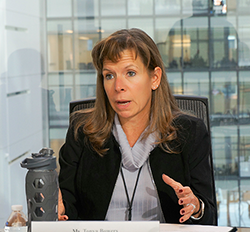Comments Requested: Proposed Research on Maternal Mortality – February 21. The National Institutes of Health (NIH) request insight on the needs of the maternal mortality research field. NIH is considering a two-pronged approach researching disparities: 1) a multi-site community-based participatory research effort to evaluate and implement effective maternal mortality interventions; and 2) research opportunities to address risk factors, particularly in minority and underserved populations.
2020 Census Response Rate Challenge
The U.S. Census Bureau created a toolkit designed to help local leaders improve their communities’ response rate in the upcoming national census. The toolkit is downloadable and contains ideas and resources for creating a local challenge, promotional materials, and general information about the 2020 Census.
Insurer Participation in State Insurance Marketplaces
The Kaiser Family Foundation reports on changes in health insurer participation from 2014-2020 for all counties in the U.S. with charts, tables, and interactive maps.
GAO Report: Barriers to Medicaid Beneficiaries’ Access to Treatment Medications
GAO Report: Barriers to Medicaid Beneficiaries’ Access to Treatment Medications. The Government Accountability Office (GAO) identifies state and federal policies that can impose barriers to Medication-Assisted Treatment (MAT) for opioid use disorder. A 2018 study found that about 40 percent of states may not provide Medicaid coverage for some MAT medications as required by law. A 2016 study of rural physicians found that more than half of providers with waivers to prescribe medications to treat addiction were not accepting new patients.
Comments Requested: HRSA Telehealth Resource Center Program
February 6, 2020
Due March 6. The Health Resources and Services Administration (HRSA) is requesting feedback from the public about a future funding opportunity for Telehealth Resource Center (TRC) Program. Specific questions pertain to use of TRC services and their effectiveness. HRSA may use the responses collected to inform policy development and program decision making, among other purposes. The responses and/or a summary of the responses will be shared with the Office for the Advancement of Telehealth in HRSA’s Federal Office of Rural Health Policy.
Comments Requested on Federal Health IT Strategic Plan
HHS seeks public comment on its draft 2020-2025 Federal Health IT Strategic Plan.
The plan focuses on health IT as a catalyst to empower patients, lower costs, deliver high-quality care, and improve health for individuals, families, and communities.
The HHS Office of the National Coordinator for Health Information Technology led the development of the plan, which was coordinated with 25 federal organizations.
The deadline for comments is March 18 at 11:59:59 p.m. EDT.
States Continue to Enact Legislation to Address Health Care Workforce Shortages
In an effort to address health care workforce shortages, 54 bills from 30 states were enacted into law in 2019 related to behavioral health providers, physician assistants, nurse practitioners and oral health providers.
The National Conference of State Legislatures discussed the legislation in a recent blog post outlining scope of practice legislation. Their work is supported through HRSA’s cooperative agreement with National Organizations of State and Local Officials (NOSLO).
National Sample Survey of Registered Nurses
HRSA has released data collected from the National Sample Survey of Registered Nurses (NSSRN). This survey data is the principal source of information on the nursing workforce, the largest group of health care professionals.
The NSSRN informs educators, health workforce leaders, and policymakers of developments in the nursing workforce. This comprehensive data set assists in developing strategies that address present-day healthcare challenges and the evolving nursing workforce needs. Since 1977, the National Sample Survey of Registered Nurses (NSSRN) has been the cornerstone of nursing workforce data.
The Global Health Care Crunch

Tonya Bowers, Deputy Associate Administrator of the Bureau of Primary Health Care, told French health officials last month that the U.S. health center population has more than doubled to 28.4 million people since the administration of President George W. Bush, and the number of health center locations has more than tripled to some 12,000.
But despite strong bipartisan support for the program and an overall growth rate of 176 percent since 2001, health services in U.S. rural areas remain “fragile.” And demand for new health center clinics is overwhelming.
“We always get more applications than we can fund,” Bowers told Celine Jaeggy of the French embassy’s office of Labor, Health and Social Welfare, which requested the meeting with HRSA staff. Bowers noted that only one of about every six proposals for 500 new health center sites got agency financing in a recent grant competition.
The pent up demand, experts say, is an increasingly familiar phenomenon worldwide.
High Deductibles Harming Patients and Providers in Rural Areas
Kaiser Health News reports that high deductibles are contributing to the rural hospital closure crisis. Due to the high deductibles, patients avoid seeking primary care services that could solve minor problems before they devolve into major health issues with much higher costs. If patients can’t afford to cover deductibles, rural hospitals often don’t get paid, even as the larger urban hospitals where patients were transferred get close to full payment from the health plan. When a rural hospital doesn’t receive payment, they incur bad debt and leaves the provider in financial distress.
